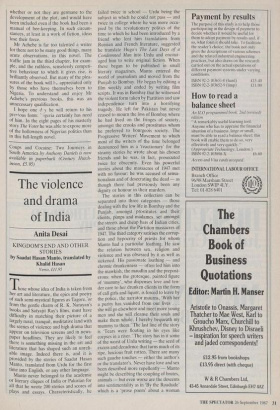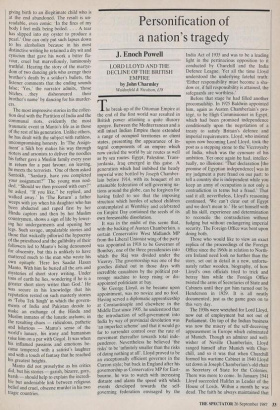The violence and drama of India
Anita Desai
KINGDOM'S END AND OTHER STORIES by Saadat Hasan Manto, translated by Khalid Hasan Verso, £11.95 Those whose idea of India is taken from her art and literature, the epics and poetry of such semi-mystical figures as Tagore, or from the gentle charm of R. K. Narayan's books and Satyajit Ray's films, must have difficulty in matching their picture of a largely rural, tranquil, meditative land with the scenes of violence and high drama that appear on television screens and in news- paper headlines. They are likely to feel there is something missing in the art and literature that has shaped such an unreli- able image. Indeed there is, and it is provided by the stories of Saadat Hasan Manto, translated from Urdu for the first time into English, or any other language.
Manto never belonged to the academic or literary cliques of India or Pakistan for all that he wrote 200 stories and scores of plays and essays. Characteristically, he
failed twice in school — Urdu being the subject in which he could not pass — and twice in college where he was more occu- pied by the revolutionary politics of the time to which he had been introduced by a friend who lent him translations from Russian and French literature, suggested he translate Hugo's The Last Days of a Condemned Man into Urdu and encour- aged him to write original fiction. When these began to be published in small literary magazines, Manto entered the world of journalism and moved from the Punjab to Bombay. He began by editing a film weekly and ended by writing film scripts. It was in Bombay that he witnessed the violent form taken by Partition and saw independence turn into a horrifying tragedy. He left for Pakistan but never ceased to mourn the loss of Bombay where he had lived on the fringes of society, amongst the crooks and prostitutes whom he preferred to bourgeois society. The Progressive Writers' Movement to which most of the writers of the time belonged denounced him as a 'reactionary' for the steamy stories he wrote about his chosen friends and he was, in fact, prosecuted twice for obscenity. Even his powerful stories about the massacres of 1947 met with no favour: he was accused of sensa- tionalism and of desecrating the dead — as though there had previously been any dignity or honour in their murders.
The stories in this collection can be separated into three categories — those dealing with the low life in Bombay and the Punjab, amongst prostitutes and their clients, pimps and madames, set amongst the streets and cheap bars of Indian cities, and those about the Partition massacres of 1947. The third category satirises the corrup- tion and hypocrisy of priests for whom Manto had a particular loathing. He saw the relation between sex, religion and violence and was obsessed by it as well as sickened. His passionate loathing — and chronic drunkenness — often led him into the mawkish, the maudlin and the prepost- erous: when the grotesque, painted figure of 'mummy', who dispenses love and ten- der care to her drunken clients in the form of call girls and liquor, is forced to leave by the police, the narrator mourns, 'With her a purity has, vanished from our lives . . she will go elsewhere and meet more young men and she will cleanse their souls and make them whole. I hereby bequeath my mummy to them.' The last line of the story is 'Tears were floating in his eyes like corpses in a river.' The story has in it some of the worst of Urdu writing — the seed of excess and decadence that turns much of its ripe, luscious fruit rotten. There are many such gauche touches — either the author's or the translator's. Never have love and sex been described more repellently — Manto might be describing the coupling of brutes, animals — but even worse are the descents into sentimentality as in 'By the Roadside' which is a 'prose poem' about a woman giving birth to an illegitimate child who is at the end abandoned. The result is un- readable, even comic: 'In the fires of my body I feel milk being boiled. . . . A tear has slipped into my oyster to produce a pearl.' One can only put such lapses down to his alcoholism because in his most distinctive writing he retained a dry wit and cynicism that gave his work a bitter fla- vour, cruel but marvellously, luminously truthful. Hearing the story of the martyr- dom of two dancing girls who avenge their brother's death by a soldier's bullets, the listener comments that the ending sounds false; 'Yes,' the narrator admits, 'those bitches. . .they dishonoured their brother's name' by dancing for his murder- ers.
The most impressive stories in the collec- tion deal with the Partition of India and the communal riots, evidently the most traumatic event in Manto's life as in those of the rest of his generation. Unlike others, he has dealt with the subject with ruthless, uncompromising honesty. In 'The Assign- ment' a Sikh boy makes his way through rioters and arsonists to deliver the noodles his father gave a Muslim family every year in return for a past favour; on leaving, he meets the terrorists. 'One of them asked Santokh, "Sardarji, have you completed your assignment?" The young man nod- ded. "Should we then proceed with ours?" he asked. "If you like," he replied, and walked away.' In 'The Return' a father weeps with joy when his daughter who has been abducted and raped first by her Hindu captors and then by her Muslim countrymen, shows a sign of life by lower- ing her undergarments and opening her legs. Such savage, unpalatable stories and those that wickedly pilloried the hypocrisy of the priesthood and the gullibility of their followers led to Manto's being .denounced for obscenity, but this is unlikely to have mattered much to the man who wrote his own epitaph: 'Here lies Saadat Masan Manto. With him lie buried all the arts and mysteries of short story writing. Under tons of earth he lies, wondering if he is a greater short story writer than God.' He was secure in his knowledge that his reputation rested on such masterly stories as `Toba Tek Singh' in which the govern- ments of India and Pakistan decide to make an exchange of the Hindu and Muslim inmates of the lunatic asylums; in the resulting chaos — ridiculous, pathetic and hilarious — Manto's sense of the world's lunacy, his irony and humanism raise him on a par with Gogol. It was when his inflamed passions and emotions be- came tempered with a satirist's laughter and with a touch of fantasy that he reached his greatest heights. Manto did not proselytise as his critics did, but his stories — garish, bizarre, gory, harsh — should help to explain the incredi- ble but undeniable link between religious belief and cruel, obscene murder in his two tragic countries.































































 Previous page
Previous page